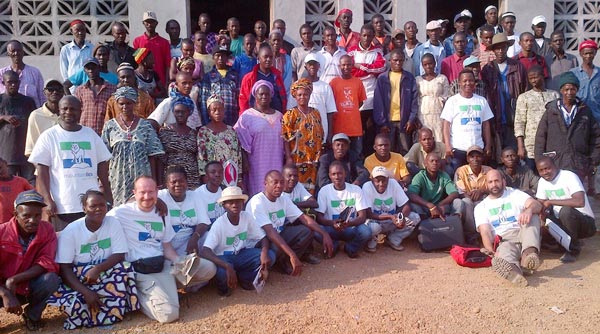Lending their six decades worth of expertise in economic and business strategies in underdeveloped countries, and $500,000 in equity, the Mennonite Economic Development Associates (MEDA) is helping to jump start a kind of agricultural revolution in Sierra Leone.
![Mountain Lion Agriculture staff members in Makeni, Sierra Leone, an enterprise supported by MEDA.[Submitted]](https://www.observerxtra.com/content/images/wp-content/uploads/2014/11/post_news_meda.jpg)
The partnership with Mountain Lion Agriculture, a rice processer in Makeni, Sierra Leone, founded by Winnipeg native Jason Dudek and Donald Smart, is helping the company grow from a network of several hundred local farmers to several thousand.
And it was a natural fit, says Dudek, MLA’s chairman and chief financial officer.
“We have a very strong partnership based on some very clear philosophical alignments. MEDA is one of the global champions of private sector focused development. In other words, they are a champion of the idea that it is economic growth that should be leading the way towards prosperity in communities and nations like Sierra Leone where poverty is the main issue that we are trying to grapple with,” he said.
“There are a lot of organizations that take the approach that we should be focusing on the role of (non-governmental organizations) and aid, but aid has had its day. I have been working in Sierra Leone for ten years and I have seen NGOs come and go, but what really makes a lasting difference in these communities is economic growth and that is the reason why we started Mountain Lion, which is a partnership between Canadians and Sierra Leoneans. It is a business, but it is a business with a purpose, and that purpose is helping small farmers and enhancing food security in Sierra Leone where people don’t have enough to eat and there is not enough food being produced.”
It’s a win-win situation, says Nigal Motts, the director of agriculture for MEDA.
“It’s quite simple really. At the end of the day, poverty reduction has to be about assisting people, in this case, farmers, to participate to their own advantage and for mutual gain, in an economy. And for them to do that effectively, they need to work with companies of one kind or another, or firms, or small businesses and supply ultimately what the market is prepared to buy.”
He added, “A lot of farmers typically, are subsistence farmers. What they grow and supply to a very localized market tends to be very low value. They don’t grow a large surplus because they don’t have access to markets. So companies like Mountain Lion Agriculture bring the access to markets. And so teaming up with them makes a whole lot of sense.”
With an influx of capital from MEDA and a number of other international donors to the tune of some $1.5 million, MLA significantly expanded its processing capacity (Motts estimated the new mill increased production from a half tonne per day to two tonnes per hour), and is looking to bring more local rice farmers into the fold.
But the rapid growth raises new challenges, which MEDA is uniquely positioned to handle.
“We do a lot of work more generally in our other projects, in mobilizing farmers and equipping them with the productive knowledge and the business knowledge to effectively band together to grow what the market wants to buy,” Motts said. “The general terminology in the industry is value-chain development. In this particular case, with Mountain Lion Agriculture having the infrastructure and the capital to progress the market, the constraint is now a shortage of supply of rice. You can go on the open market to purchase rice, but the problem with that is you get a lot of variability in the rice that you buy and that undermines profitability and forces the company to offer lower prices to farmers for their product. So effectively we are taking our value-chain development expertise and using it to help this company build its own supply chain of thousands of farmers.”
Ultimately, he added, “the goal is to establish a profitable rice supply chain that is of mutual benefit to both the company and to the thousands of farmers who will be involved.”
Getting the local farmers on board is a challenge, Motts said. The process also involves teaching farmers how to optimize their yields and maintain quality assurance standards.
But the long term benefits could be immense, which is why the company recently received the 2014 Social Finance Innovator Award at the Social Finance Forum.
“MLA is the sole domestic supplier of branded rice products in Sierra Leone, currently operating a processing mill and a 100 hectare seed multiplication farm,” the Social Finance organization stated. “With MEDA’s support, MLA is now implementing a smallholder out-grower scheme. This program will expand MLA’s unique business model to include 5,000 new Sierra Leonean famers, giving them the opportunity to rise out of poverty while enhancing the country’s own food security.”
While 2014 brought the devastating ebola crisis to the region, killing an MLA employee and disrupting travel, the company continues to work towards its goal.
“We are very, very fortunate, and I would say, we are absolutely blessed to have MEDA as a partner because they have done projects with thousands and thousands of farmers before and they have decades of experience and so we kind of get to tap into all of that as a fairly new company,” Dudek said.








